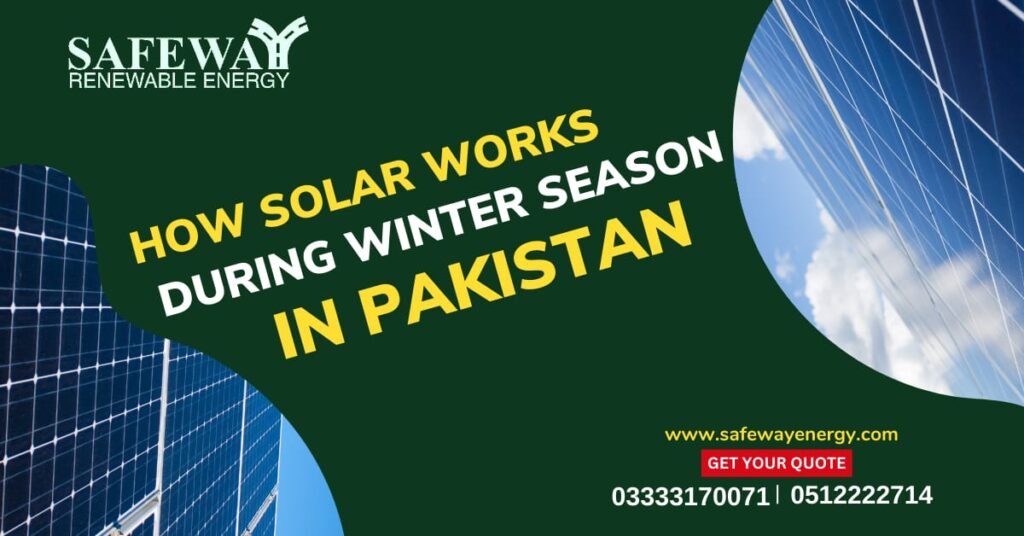
In Pakistan, the winter season can be harsh. The temperatures can drop significantly, and the days are shorter. This can make it difficult to keep your home heated. However, if you have a solar system installed, you can take advantage of the sun’s energy to help keep your home warm. Solar systems work by collecting sunlight and converting it into electrical energy. This electricity can then be used to power your home’s heating system. So even when the weather outside is cold, you can stay cozy and warm inside thanks to your solar system.
In addition to helping you stay warm, solar energy can also help you save money. Because the sun’s energy is free, you can reduce your electricity bills significantly. This makes solar an attractive option for anyone looking to cut down on their electricity costs. Solar systems also have low maintenance costs and don’t require a large upfront investment.
If you’re thinking of installing a solar system in your home during the winter season, there are a few things to keep in mind. First, make sure that your roof gets enough sunlight throughout the day so that your system can work effectively. You should also invest in quality panels and equipment that are suitable for cold weather conditions. And finally, be sure to check with your local government to see what incentives or subsidies they may offer for installing a solar system.
For solar lovers in Pakistan, winter can be a challenging time of year. Photovoltaic solar systems rely on the sun’s rays to generate electricity, so when the days are shorter and shadows are longer, solar energy production may suffer. However, solar is still possible in wintertime conditions in Pakistan. With strategic solar panel placement and angle-adjusting solar trackers, solar users can maximize seasonal sunlight exposure throughout the cold months–ensuring that solar energy production isn’t reduced too seriously during winter season. Furthermore, with winter fogs that often roll through the region, diffused solar radiation may be absorbed into the panels instead of being completely blocked from view. In addition, many solar panel manufacturers have designed products specifically designed to perform better under cooler temperatures; these PV cells are uniquely suited to maximize solar harvesting given Pakistan’s mild but chilly weather patterns. Ultimately, although challenges for solar energy production certainly emerge during winter in Pakistan, it is possible to continue maximizing solar energy output even in the depths of winter. With proper preparation and usage of modern PV technologies, using solar power is still viable year-round in this country – including during winters!
Net Metering
Net metering in Pakistan has become more readily available, providing an opportunity for solar energy systems to be used as an affordable and reliable electricity solution. This system allows solar systems to be connected directly to the electrical grid, allowing solar owners to send the excess solar electricity generated from their solar system back onto the grid for credits against future electricity bills. This incentivizes solar owners to install solar panels and greatly supports a shift away from dependence on other forms of energy generation such as oil and gas. However, current net metering incentives still require improvement and Pakistan has yet to realize a solar revolution that is seen in other countries like India or China. Thus, further support from the government may be needed to promote solar installations and reduce reliance on other fuel sources in this region.
Despite the winter season in Pakistan usually raging from December through February, solar energy can be a viable source of renewable energy all year long. While it may feel like solar is hampered during the cooler months, solar panels are still able to produce electricity when receiving direct sunlight, regardless of the time of year. Solar systems contain solar cells that convert photon energy into electrical current and store this in solar batteries. Even if the days are shorter and it’s overcast in winter months, solar panels will still generate some energy, provided there is light coming through clouds or precipitation. Furthermore, solar systems are designed for longer life cycles; so even if the output capabilities lessen during the winter season due to temperature variations, you can expect your system to function healthily for years to come with periodic maintenance. In short, while solar output may be reduced in winter months compared to summer ones in Pakistan due to shorter days and cloud coverage, solar remains a viable renewable source of energy generation any time of year.
With the right preparation, you can make the most of your solar system during the winter season in Pakistan and experience all the benefits that come with it. You’ll be able to stay warm, save money and reduce your carbon footprint at the same time. So if you’re looking for an energy solution that will keep working even when temperatures drop, consider investing in a Safeway solar system today!
How We Can Help with Solar Panels
Do you want to use solar power? Do your electricity bills seem too high and burden the budget every month, leaving little room for other essential expenses such as mortgage or rent payment. If this sounds like an unfortunate reality of life in Pakistan then we have good news! With our top tier system design services at affordable prices it is now possible make more sustainable choices with less financial stress on family budgets across all income brackets by using energy efficiency technologies that will cut down consumption levels significantly while still producing enough clean renewable Thanks for reading! We hope this article has helped you better understand how solar works during the winter season in Pakistan. If you have any other questions please don’t hesitate to reach out.
